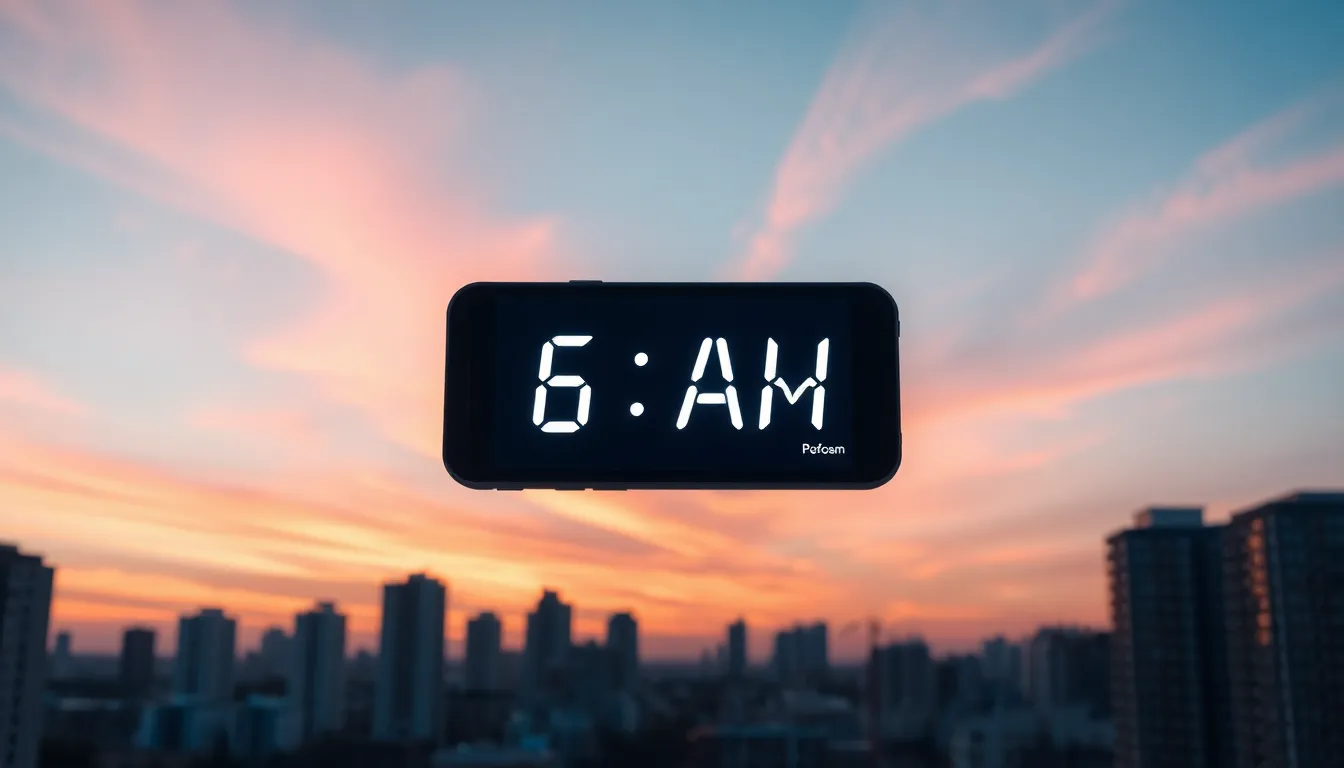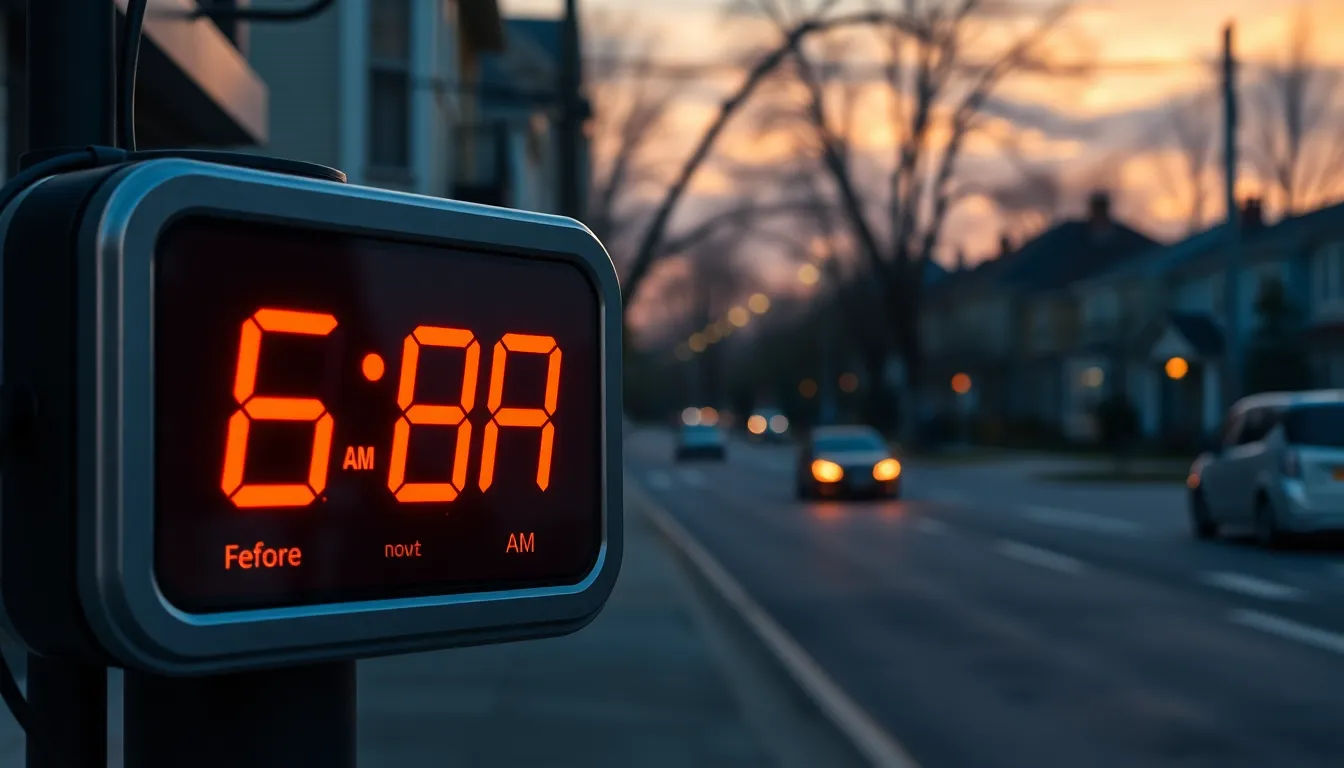Table of Contents
ToggleAs the clock ticks closer to 6 AM, a familiar battle unfolds: the struggle between the cozy embrace of sleep and the relentless march of time. For night owls and early risers alike, the question looms large—how much longer until that magical hour arrives? Whether it’s the last-minute Netflix binge or the existential dread of an impending alarm, the countdown can feel both exhilarating and torturous.
Understanding Time Perception
As individuals approach 6 AM, their perception of time often shifts. The way time feels can greatly affect one’s experience during those final hours of night.
The Concept of Time
Time represents a continuous progression of events. People often measure it in hours, minutes, and seconds. Clocks define this measurement, but feelings about time can vary widely. For many, the minutes leading to 6 AM may seem to stretch indefinitely or fly by, depending on their circumstance. Looking at the clock can become a habit, influencing their readiness for the demands of the day ahead.
Psychological Factors Impacting Time Perception
Psychological factors play a significant role in how time is perceived. Anxiety can distort time, making moments feel longer, while excitement can cause it to pass quickly. When anticipating the alarm at 6 AM, a blend of these emotions can influence the countdown experience. Fatigue also alters perception, leading nights to feel longer for some. Sleep patterns, lifestyle, and personal experiences further shape these perceptions. Understanding these dynamics provides insight into the feelings of those awaiting morning’s arrival.
Calculating Time Until 6 AM



Determining how much longer until 6 AM requires clear methods. Approaches are diverse, based on individual circumstances and current time.
Methods of Time Calculation
Calculating time until 6 AM starts with the current hour. Subtracting the current hour from six gives an instant answer. If it’s 3 AM, three hours remain until 6 AM. A digital clock can simplify this process, displaying minutes and hours remaining. Individuals can also use mobile devices for countdown timers to track the time. Writing down the remaining hours and minutes can help visualize the countdown effectively.
Time Zones and Their Effect
Time zones impact the calculation until 6 AM significantly. Different areas experience dawn at varied times. For someone in New York, 6 AM arrives sooner than in Los Angeles. Understanding local time zones ensures accurate time awareness. It’s essential to consider Daylight Saving Time changes, as these can shift local hours. This variation can affect schedules, travel plans, and daily routines, creating a need for constant adjustment.
Cultural Perspectives on Time
Cultural interpretations of time vary significantly around the globe. Different societies emphasize distinct approaches to time management and punctuality, impacting daily life.
Time Awareness in Different Cultures
Time awareness reflects cultural values and practices. In several Western cultures, punctuality signifies respect and professionalism. Individuals prioritize schedules and adhere to deadlines. In contrast, some cultures, such as those in parts of Latin America and Africa, view time more fluidly. Here, social interactions take precedence over rigid schedules. Celebrations and events often start later than planned, allowing for a more relaxed approach to time.
The Importance of Timeliness
Timeliness plays a crucial role in many facets of modern life. For businesses, timely actions can enhance productivity and collaboration. Employees’ dedication to punctuality influences workplace dynamics. In personal relationships, being on time demonstrates respect for others’ time. Cultural expectations shape perceptions of timeliness. Individuals who meet these expectations foster positive impressions and strengthen bonds. Conversely, habitual tardiness may strain relationships and create misunderstandings, underscoring the need for awareness of cultural nuances surrounding time.
Practical Tips for Managing Time
Time management can significantly ease the transition into early morning hours. Staying productive during the late-night hours enhances both creativity and efficiency.
Tips for Staying Productive Late at Night
Prioritize tasks by importance. Identify high-impact activities that demand focus. Utilize tools like to-do lists to track progress. Break work into manageable chunks to avoid feeling overwhelmed. Set timers to create a sense of urgency. Implementing designated breaks boosts energy levels and maintains motivation. Experiment with different environments, as a change of scenery can stimulate productivity. Limit distractions by using apps that block social media during work hours.
Strategies for Better Sleep Hygiene
Establishing a regular sleep schedule promotes better rest. Going to bed and waking up at the same time daily trains the body’s internal clock. Create a calming bedtime routine to signal the wind-down process. Consider implementing relaxation techniques, such as deep breathing or gentle stretching before sleep. Reducing screen time 30 to 60 minutes before bed can improve sleep quality. Keeping the sleep environment dark and cool enhances comfort. Avoid heavy meals and caffeine in the hours leading up to bedtime.
As the clock ticks closer to 6 AM individuals navigate a complex blend of emotions and experiences. Whether grappling with fatigue or feeling the thrill of a new day the anticipation can be both daunting and invigorating. By understanding the psychological nuances of time perception and incorporating practical strategies for time management and sleep hygiene one can better prepare for the arrival of morning. Recognizing the cultural differences in time interpretation also enriches the experience making it clear that the journey to 6 AM is more than just a countdown. Embracing these insights can lead to a more mindful approach to the hours leading up to dawn.




